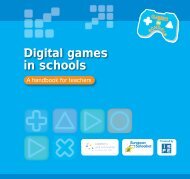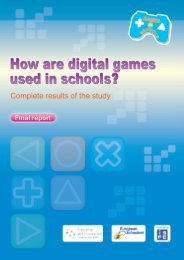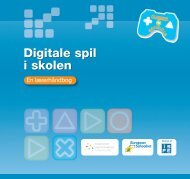Quels usages pour les jeux électroniques en classe ? - Games in ...
Quels usages pour les jeux électroniques en classe ? - Games in ...
Quels usages pour les jeux électroniques en classe ? - Games in ...
Create successful ePaper yourself
Turn your PDF publications into a flip-book with our unique Google optimized e-Paper software.
Subrahmanyam, K., Kraut, R., Gre<strong>en</strong>field, P., & Gross, E. (2000). The impact of home computer use on<br />
childr<strong>en</strong>’s activities and developm<strong>en</strong>t. Childr<strong>en</strong> and Computer Technology, 10(2), 123-44.<br />
Sweetser, P., & Wyeth, P. (2005). Gameflow: A model for evaluat<strong>in</strong>g player <strong>en</strong>joym<strong>en</strong>t <strong>in</strong> games. Computers<br />
<strong>in</strong> Enterta<strong>in</strong>m<strong>en</strong>t, 3(3).<br />
Tabula Digita, (2006). Gam<strong>in</strong>g technology speaks stud<strong>en</strong>ts’ language: Makes learn<strong>in</strong>g math as easy as 6 +<br />
[4W] – 6 = 24. Retrieved from http://www.dim<strong>en</strong>sionm.com/how/CaseStudy_OcoeeMS.pdf<br />
Thomas, P., & Macredie, R. (1994). <strong>Games</strong> and the design of human-computer <strong>in</strong>terfaces. Educational<br />
Technology, 31(2), 134-42.<br />
Thomas, R., Cahill, J., & Santilli, L. (1997). Us<strong>in</strong>g an <strong>in</strong>teractive computer game to <strong>in</strong>crease skill and selfefficacy<br />
regard<strong>in</strong>g safer sex negotiation: Field test results. Health Education & Behavior: the<br />
Official Publication of the Society for Public Health Education, 24(1), 71-86.<br />
Turn<strong>in</strong>, M. C., Couvaras, O., Jouret, B., Tauber, M. T., Bolzonella, C., Fabre, D., et al. (2000). Learn<strong>in</strong>g good<br />
eat<strong>in</strong>g habits play<strong>in</strong>g computer games at school: A 2000 childr<strong>en</strong> evaluation. Diabetes Research<br />
and Cl<strong>in</strong>ical Practice, 50(1001), 239-39.<br />
Vygotsky, L. (1978). M<strong>in</strong>d <strong>in</strong> society: The developm<strong>en</strong>t of higher psychological processes. Cambridge, MA:<br />
Harvard University Press.<br />
Wa<strong>in</strong>ess, R. (2007). The pot<strong>en</strong>tial of games & simulations for learn<strong>in</strong>g and assessm<strong>en</strong>t, 2007 CRESST<br />
Confer<strong>en</strong>ce: The Future of Test-based Educational Accountability. Los Ange<strong>les</strong>, CA.<br />
Wartella, E. (2002). New g<strong>en</strong>erations – new media. Nordicom Review, 1(2), 23-36.<br />
Wiebe, J. H., & Mart<strong>in</strong>, N. J. (1994). The impact of a computer-based adv<strong>en</strong>ture game on achievem<strong>en</strong>t and<br />
attitudes <strong>in</strong> geography. Journal of Comput<strong>in</strong>g <strong>in</strong> Childhood Education, 5(1), 61-71.<br />
Wylie, C. (2001). Mak<strong>in</strong>g s<strong>en</strong>se: Relations betwe<strong>en</strong> literacy, television use, computer use and other uses of<br />
childr<strong>en</strong>'s time. Paper pres<strong>en</strong>ted at the Annual Confer<strong>en</strong>ce of the New Zealand Association for<br />
Research <strong>in</strong> Education, Christchurch, New Zealand.<br />
Yatim, M. (2008) Usability and Fun Evaluation of a Game Author<strong>in</strong>g Tool In Proceed<strong>in</strong>gs of World<br />
Confer<strong>en</strong>ce on Educational Multimedia, Hypermedia and telecommunications 2008, Vi<strong>en</strong>na,<br />
Austria, pp. 1504 – 1511.<br />
Zagal, J.P., Rick, J. & Hsi, I. (2006). Collaborative games: Lessons learned from board games. Simulation &<br />
Gam<strong>in</strong>g. An Interdiscipl<strong>in</strong>ary Journal of Theory, Practice and Research. 37(1), 24-40.<br />
161






